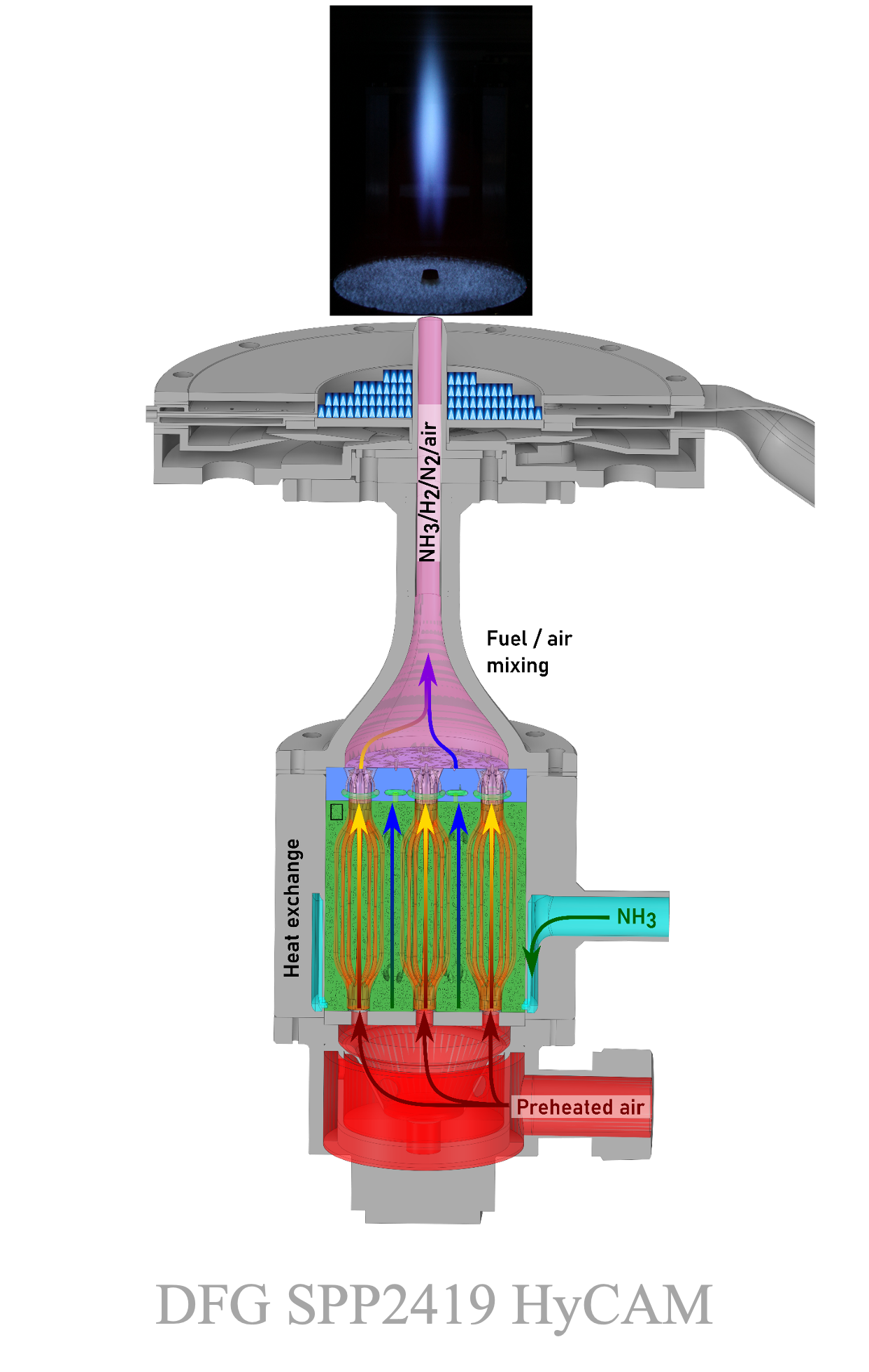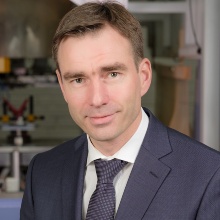08 - Low NOx thermochemical conversion of ammonia
Summary
The primary objective of the research proposed as part of the SPP is the proof-of-concept for direct thermochemical conversion of ammonia in high-power density combustion applications with minimum NOX and NH3 slip. The development is facilitated by combining three key technologies: (i) additive manufacturing that enables the design of a (ii) high yield in situ NH3 reformer for subsequent combustion of H2-enriched blends in an (iii) auto-ignition stabilized combustion process. The reformer and combustor operate at the same temperature rendering the combination very promising. In situ NH3 cracking to NH3-H2-N2 mixtures capitalizes on the advantageous combustion characteristics of H2 (i.e. extended lean flammability limits, strain resilience and load flexibility), offers targeted NOX minimization while circumventing the distribution related challenges of H2. For this purpose, we shall develop multi-material and micro-dosing AM processes for a gas permeable high surface area fuel reformer, with catalytic enhancement to ease the reaction kinetics, that is integrated into a heat exchanger. The combination facilitates the required conversion rates and yield for gas turbine operation with high power density. In this context, the identification of suitable and AM fabricable material combinations as well as the corresponding performance optimization are essential. Due to the heat exchange with the combustion air, the reformer performance depends on the operation conditions. This results in a wide range of feasible NH3-H2-N2 blends and requires a fuel flexible combustion process. Auto-ignition stabilized combustion, FLOX or MILD are arguably well-suited for this purpose while offering low thermal NOX. However, NOX formation in NH3-H2-N2-air flames with variable composition is highly non-linear due to complex turbulence-chemistry interactions and necessitates improved fundamental understanding that will be advanced as part of the proposed research. In order to fully capitalize on the burning mode benefits, homogeneous fuel / air mixing is essential to avoid local hot spots, reduce thermal NOX and improve ignition and combustion control. “Form-follows-function” design freedom of AM enables the development of gas injection and micro-mixing concepts that can provide a fuel composition and injection momentum independent homogeneity. In this context, AM parameters are optimized and models developed for function-oriented build processes of porous media and support-free micro channels. Finally, we shall integrate the AM fuel reformer, gas injection, and micro-mixing components into the proof-of-concept burner facility for a comprehensive co-optimization in phase II of the SPP. The findings enable the technology development of low NOX ammonia thermochemical conversion systems for stationary and micro gas turbine engines providing a low carbon footprint solution for applications in the heat and power generation as well as transportation sector.

Research Team
![[:de]Hampp[:] [:de]Hampp[:]](https://spp2419.rwth-aachen.de/wp-content/uploads/2024/04/Hampp-e1714656666419.jpg)
Dr. Fabian Hampp
Principal Investigator (PI)
University of Stuttgart
Institute of Combustion Technology for Aerospace Engineering
fabian.hampp(at)ivlr.uni-stuttgart.de

Prof. Dr.-Ing. Hans-Christian Möhring
Principal Investigator (PI)
University of Stuttgart
Institute for Machine Tools
hans-christian.moehring(at)ifw.uni-stuttgart.de
![[:de]Kraus[:] [:de]Kraus[:]](https://spp2419.rwth-aachen.de/wp-content/uploads/2024/04/Kraus.jpg)
Dr. Peter Kraus
Principal Investigator (PI)
Universität Berlin
Institute of Materials Science and Technology
peter.kraus(at)ceramics.tu-berlin.de
![[:de]Ahn[:] [:de]Ahn[:]](https://spp2419.rwth-aachen.de/wp-content/uploads/2024/04/Ahn.jpg)
Jihwan Ahn
Doctoral Researcher
University of Stuttgart
Institute of Combustion Technology for Aerospace Engineering
jihwan.ahn(at)ivlr.uni-stuttgart.de

Sohan Acharya
Doctoral Researcher
University of Stuttgart
Institute for Machine Tools
sohan.acharya(at)ifw.uni-stuttgart.de



